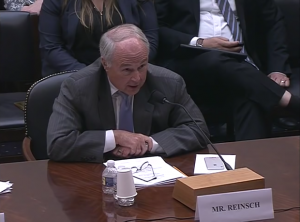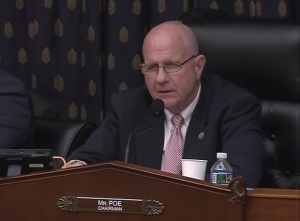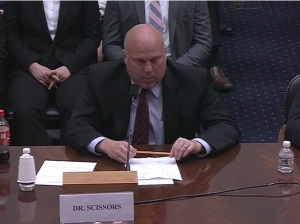On the afternoon of Wednesday, July 11th, the House Subcommittee on Terrorism, Nonproliferation, and Trade and the House Subcommittee on Asia and the Pacific held a joint hearing titled China’s Predatory Trade and Investment Strategy. The day’s hearing featured discussion of actions the U.S. government should be taking in order to counter deceptive trade practices pursued by the Chinese government, a topic which has become a main theme of the administration of President Donald Trump.
The opening statement of Congressman Ted Poe (R-TX), chairman of the House terrorism subcommittee, spoke to many ways which the Chinese government bends the rules to achieve economic dominance. These include stealing IP, enforcing tech transfers for market access, imposing discriminatory licenses on foreign companies and investing in U.S. companies to acquire sensitive technologies. Congressman William Keating (D-MA), ranking member of the House terrorism subcommittee, noted that last week’s decision by China to place retaliatory tariffs on American pork and soybean products officially started the current trade war, but also that China’s deceptive trade and investment tactics have long been an issue. Both Keating and Congressman Ted Yoho (R-FL), chairman of the House Asia committee, questioned the Trump administration’s reliance on tariffs but both acknowledged that action against China needed to be taken.
By contrast, Congressman Brad Sherman (D-CA), ranking member of the House Asia committee, was very critical of President Trump’s recent actions which Sherman called timid, weak and unplanned. Sherman said that the trade war with China got underway 18 years ago when Congress voted to approve most favored nation (MFN) status for China to increase trade relations with that country. “Before Democrats get carried away with the desire to repudiate our position, remember that 65 percent of Democrats voted no on MFN for China,” Sherman said. “We should not abandon that position just because some Republicans or the White House have embraced it.” Among the various practices cited by Sherman and used by the Chinese government to tip the scale of trade include the introduction of a new “social credit score” which intimidates Chinese citizens and businesses to buy Chinese goods or risk losing a passport or a loan opportunity for a bad score. Sherman’s comments on Trump’s actions did create a small dustup with Congressman Dana Rohrabacher (R-CA), who gave a short opening statement. “It’s a little disconcerting to hear our President be called weak when he’s trying to do something that no other President has tried to do,” Rohrabacher said. “It was Clinton who gave us that free trade. And did Obama do anything for the last eight years? Nothing like this President’s doing.”
Although China has a large economy, panel witness Derek Scissors, Resident Scholar at the American Enterprise Institute, noted that China has an aging populace and is highly indebted as a society. “China keeps its domestic finances walled off from its international finances because if it doesn’t, money will pour out of the country even faster than it is now,” Scissors said. “Getting back to my first point about people who think China’s a powerhouse and is growing really rapidly, then why is money leaving the country on a net basis every year?”
Despite initiatives like the Made in China 2025 program, there’s no way for the Chinese economy to get close to catching up to the United States’ competitive advantage in many industries over the next 20 to 30 years without cheating by stealing innovation according to panel witness Robert Atkinson, President of the Information Technology and Innovation Foundation. Atkinson argued in his opening statement for a stronger antitrust regime to go after specific Chinese firms, such as rules prohibiting Chinese firms that have stolen U.S. IP from using our nation’s banking and financial systems. The testimony of panel witness William Reinsch, the Scholl Chair in International Business at the Center for Strategic and International Studies, advocated for expanded Committee on Foreign Investment in the United States (CFIUS) review to cover a larger number of transactions in which the Chinese government invests in innovative American startups. Reinsch argued for building international coalitions that could call out the Chinese on poor trade practices, noting that the Chinese do not like to be “singled out as rules violators.”

William Reinsch, Scholl Chair in International Business, Center for Strategic and International Studies
One particularly problematic area which gives the Chinese government access to a good deal of U.S. research and development is university researchers who are not subject to the same CFIUS review rules as are private entities. “I’ve seen university professors from the university I graduated from talking about doing a sabbatical in China and they’re going to pay them four to five times what they’re making here and I asked them what they’re working,” Congressman Yoho said. “They said, ‘We’re going to take our research and go over there,’ and I said, ‘I don’t think that’s a good idea.’” Reinsch was particularly scathing in his response to Yoho’s concerns.
“Universities are the worst, frankly. First of all, every professor is his own empire and trying to create a central administration to impose some discipline is like herding cats, it’s very difficult. And second, there’s an attitudinal issue, frankly. For them, this is not technology transfer, this is research, and you need to get them to think about it differently.”
Efficient infringer ally and patent troll Congressman Darrell Issa (R-CA) asked the panel whether there were two Chinas, one which had an economy state-controlled by the Communist Party and the other an oppressed free enterprise China which yearned to compete against state-owned enterprises (SOEs). “There are a lot of cities where you see ‘Free China,’ they’re just not in China,” Scissors said. Atkinson spoke about a meeting he had with one CEO of a privately-owned Chinese company who had complaints about competition from a Chinese-backed SOE. “[The CEO] felt it was completely unfair,” Atkinson said. “Now he can’t say that outside the room when he was meeting with me, but he feels it.” Issa, noting his membership on the House Judiciary Committee, asked:
“Should we, in fact, begin to look at the question posed this way: Inherently, isn’t a government-owned run or, in fact, subsidized enterprise, automatically essentially a monopoly in the sense that it has powers that an ordinary company, no matter what their market share, would not have, and wouldn’t that be the first step to look at state-owned enterprises… internationally as, in fact, by definition failing the first checkmark of an antitrust question of a monopoly?”
In his questioning, Congressman Poe asked the panel how Congress could best act to both hold back the Chinese government and let the United States run faster to counteract China’s international cheating. Looking at the example of Chinese telecom ZTE, which had been targeted by a Commerce Department ban in recent weeks, Scissors noted that the American government could hurt the Communist Party by targeting China’s large SOEs. Domestically, Atkinson argued for a more generous research & development tax credit, noting that the U.S. had what he called the 27th-least generous R&D tax credit. Reinsch was supportive of the House of Representatives’ recent passage of the Foreign Investment Risk Review Modernization Act (FIRMMA) and urged Congress to communicate more with third-party countries to reduce Chinese influence.
“Listening to them, figuring out what they need, helping them… is extraordinarily important. Running faster… it’s a question of how do we help our people innovate. We’ve done this before. When I refer to the Lincoln Administration, land-grant colleges, Homestead Act, we created the most effective, efficient, world-class agriculture industry in the world, and that was government devotion of resources and focusing of attention on it. We did the same thing with wireless communication, we did the same thing with aerospace, we did the same thing with the Internet. There’s no reason why we can’t do that going forward with the next generation of technologies and stay ahead of the Chinese that way.”

![[IPWatchdog Logo]](https://ipwatchdog.com/wp-content/themes/IPWatchdog%20-%202023/assets/images/temp/logo-small@2x.png)



![[Advertisement]](https://ipwatchdog.com/wp-content/uploads/2024/04/Patent-Litigation-Masters-2024-sidebar-700x500-1.jpg)

![[Advertisement]](https://ipwatchdog.com/wp-content/uploads/2021/12/WEBINAR-336-x-280-px.png)
![[Advertisement]](https://ipwatchdog.com/wp-content/uploads/2021/12/2021-Patent-Practice-on-Demand-recorded-Feb-2021-336-x-280.jpg)
![[Advertisement]](https://ipwatchdog.com/wp-content/uploads/2021/12/Ad-4-The-Invent-Patent-System™.png)






Join the Discussion
No comments yet.